Thomas Buttes of Riburgh
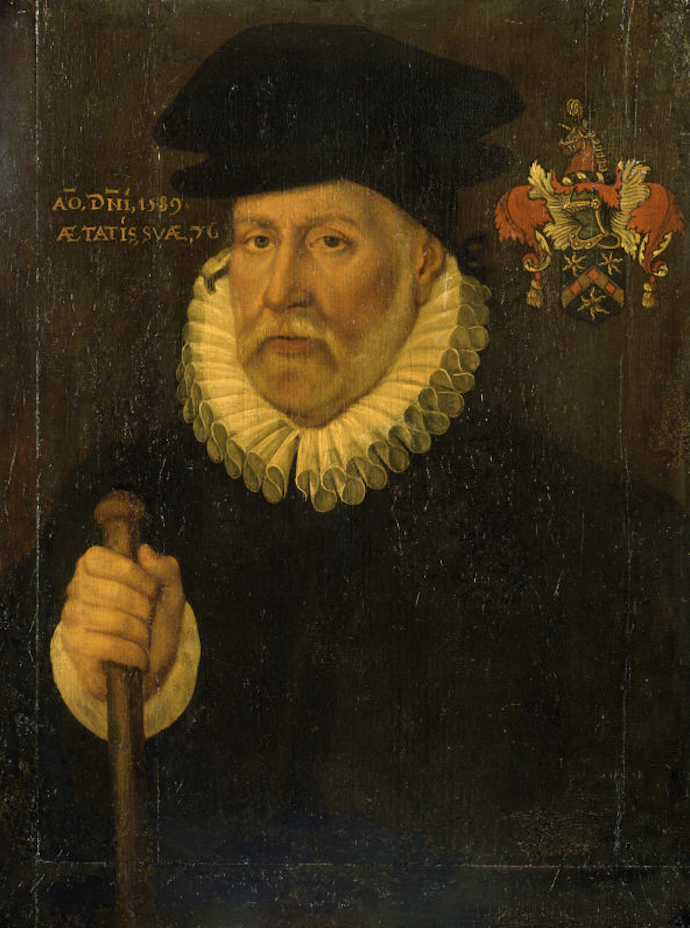
HughendenCMS_PCF_429039 Collections – Public ©National Trust Images
On 22 January 1592 Thomas was laid to rest in the Chancel at St Andrew’s under
the terms of his will:
"My body to be buried in the Chancel of Gt Ryburgh within one foot of the
tomb which I have made for my late wife"
If, as the portrait above says, he was 76 in 1589, he was already exceptional to
have reached that age and to go on to be 78/79 when he died. However, an
unverified source says he was born in 1516 and therefore would only have
been 76 when he died but for the time being we may be satisfied that he
was an old man
A single date in a register doesn’t mean anything without the context of other
dates in that same life and the only way to bring this portrait to life is to look at
those other dates and in the process, perhaps find his true date of birth. On this
page the task will be carried out at random as the research opportunities arise
and a good place to start is with that old man being interviewed by one
Richard Hakluyt as the sole survivor of an infamous voyage to the
Newfoundland Coast. It is tempting to infer from the following that this took
place in Ryburgh Hall, but there is no evidence for this:
”as hee told me Richard Hakluyt of Oxford himselfe, to whom I rode 200. miles
onely to learne the whole trueth of this voyage from his own mouth, as being t
he onely man now alive that was in this discoverie.”
So we start in 1537 with Thomas, a young gentleman and a transcription of the
writings of his inquisitor as part of the collection of narratives much studied and
reissued entitled
The Principall Navigations, Voiages, and Discoveries of the English Nation (1589).
This transcription is from an edition of 1889 edited by Edmund Goldsmit:
Navigations, Voyages, Traffiques, and Discoveries. Vol X11 page 294
The voyage M. Hore and diuers other gentlemen, to Newfoundland, and Cape Briton, in the yeere 1536 and in the 28 yere of king Henry the 8. One master Hore of London, a man of goodly stature and of great courage, and giuen to the studie of Cosmographie, in the 28 yere of king Henry the 8 and in the yere of our Lord 1536 encouraged diuers Gentlemen and others, being assisted by the kings favor and good countenance, to accompany him in a voyage of discouerie upon the Northwest parts of America: wherein his perswasions tooke such effect, that within short space many gentlemen of the Innes of court, and of the Chancerie, and diuers others of good worship, desirous to see the strange things
Traffiques, and Discoveries p 295
of the world, very willingly entered into the action with him, some of whose names were as followeth : M. Weekes a gentleman of the West countrey of five hundred markes by the yeere liuing. M. Tucke a gentleman of Kent. M. Tuckfieid. M. Thomas Buts the Sonne of Sir William Buts knight, of Norfolke, which was lately liuing, and from whose mouth I wrote most of this relation. M. Hardie, M. Biron, M. Carter, M. Wright, M.Rastall Serjeant Rastals brother, M. Ridley, and divers other, which all were in the Admyrall called the Trinitie, a ship of seuen score tunnes, wherein M.Hore himselfe was imbarked. In the other ship whose name was the Minion, went a very learned and verturus gentleman one M. Armiigil Wade, Afterwards Clerke of the Counsailes of king Henry the 8 and king Edward the sixth, father to the worshipfull M. William Wade now Clerke of the privie Counsell, M. Oliuer Dawbeney marchant of London, M. loy afterward gentleman of the Kings Chappell, with diuers other of good account. The whole number that went in the two tall ships aforesaid to wit, the Trinitie and the Minion, were about six score persons, whereof thirty were gentlemen, which all were mustered in warlike maner at Gravesend, and after the receiving of the Sacrament, thcy embarked themselves in the ende of Aprill. 1526.
From the time of their setting out from Gravesend, they were very long at sea, to witte, aboue two moneths, and neuer touched any land vntill they came to part of the West Indies about Cape Briton, shaping their course thence Northeastwardes, vntill they came to the Island of Penguin , which is very full of rockes and stones, whereon they went and found it full of great foules white and gray, as big as geese, and they saw infinite numbers of their egges. They drave a great number of the foules into their boates upon their sayles, and tooke up many of their egges, the foules they flead and their skinnes were very like hony combes full of holes being flead off : they dressed and eate them and found them to be very good and nourishing rmeat They saw also store of beares both blacke and white, of whome they killed some, and tooke them for no bad foode.
M. Oliuer Dawbeny, which (as it is before mentioned) was in this voyage, and in the Minion, told M. Richard Hakluyt of the middle Temple these things following : to wit, That after their arrivall in Newfoundland, and having bene there
Navigations, Voyages, p 296
certaine dayes at ancre, and not having yet seene any of the naturall people of the countrey, the same Dawbeney walking one day on the hatches, spied a boate with Savages of those parts, rowing down the Bay toward them, to gaze vpon the ship, and our people, and taking viewe of willed them to come up if they would see the natural people of the countrey, that they had so long and so much desired to see : whereupon they came up, and tooke viewe of the Savages rowing toward them and their ship, and upon the viewe they manned out a ship-boat to meet them and to take them. But they spying our ship-boat making towards them, returned with maine force and fled into an Island that lay up in the Bay or river there, and our men pursued them into the Island, and the Savages fledde and escaped : but our men found a fire, and the side of a beare on a wooden spit left at the same by the Savages that were fled.
There in the same place they found a boote of leather garnished on the outward side of the calfe with certaine brave trailes, as it were of rawe silke, and also found a certaine great warme mitten And these caryed with them, they returned to their shippe, not finding the Savages, nor seeing any thing else besides the soyle, and the things growing in the same, which chiefely were store of firre and pine trees.
And further, the said M. Dawbeny told him, that lying there they grew into great want of victuals, and that there they found small reliefe, more then that they had from the nest of an Osprey, that brought hourely to her yong great plentie of diuers sorts of fishes. But such was the famine that increased amongst them from day to day, that they were forced to seeke to relieve themselues of raw herbes and rootes that they sought on the maine : but the famine increasing, and the reliefe of herbes being to little purpose to satisfie their insatiable hunger, in the fieldes and desertes here and there, the fellowe killed his mate while he stooped to lake up a roote for his reliefe, and cutting out pieces of his bodie whom he had murthered, broyled the same on the coles and greedily devoured them. By this meane the company decreased, and the officers knew not what was become of them; And it fortuned that one of the company driuen with hunger to seeke abroade for reliefe found
Traffiques, and Discoveries. p 297
out in the fieldes the sauour of broyled flesh, and fell out with one for that he would suffer him and his fellowes to sterve, enioying plentie as he thought : and this matter growing to cruell speaches, he that had the broyled meate, burst out into these wordes : If thou wouldest needes know, the broyled meate that I had was a piece of such a mans buttocke. The report of this brought to the ship,the Captaine found what became of those that were missing, and was perswaded that some of them were neither devoured with wilde beastes, nor yet destroyed by Savages: And hereupon hee stood up and made a notable Oration, containing, Howe much these dealings offended the Almightie, and vouched the Scriptures from first to last,what God had in cases of distresse done for them that called vpon them, and told them that the power of the Almighty was then no lesse, then in all former time it had bene. And added, that if it had not pleased God to have helpen them in that distresse, that it had bene better to haue perished in body, and to haue liued euerlastingly, then to haue relieved for a poore time their mortal bodyes, and to bee condemned everlastingly, both body and soule to the un-quenchable fire of hell. And thus hauing ended to that eflect, he began to exhort to repentance, and besought all the company to pray, that it might please God to looke upon their miserable present state and for his owne mercie tor elieve the same. The famine increasing, and the inconvenience of the men that were missing being found, they agreed amongst themselues rather then all should perish, to cast lots who should be killed : And such was the mercie of God, that the same night there arrived a French ship in that port, well furnished with vittale and such was the policie of the English, that they became masters of the same,and changing ships and vittailing them, they set sayle to come into England.
In their journey they were so farre Northwards, that they sawe mighty Islands of yce in the sommer season, on which were hawkes and other foules to rest themselves being weary of flying over farre from the maine. They sawe also certaine great white foules with red bils and red legs, some what bigger then Herons, which they supposed to be Storkes. They arrived at S. lves in Cornewall about the ende of October. From thence they
Navigations, Voyages, p 298
departed vnto a certaine castle belonging to sir John Luttrel, where M. Thomas Buts, and M. Rastall and other Gentlemen of the voyaye were very friendly entertained: after that they came to the Earle of Bathe at Bathe, and thence to Bristoll, so to London. M. Buts was so changed in the voyage with hunger and miserie, that sir William his father and my Lady his mother knew him not to be their sonne, vntill they found a secret marke which was a wart vpon one of his knees, as hee told me Richard Hakluyt of Oxford himselfe, to whom I rode 200. miles onely to learne the whole tnueth of this voyage from his own mouth, as being the onely man now alive that was in this discouerie.
Certaine moneths after, those Frenchmen came into England, and made complaint to king Henry the 8: the king causing the matter to be examined, and finding the great distresse of his subiects, and the causes of the dealing so with the French, was so mooved with pitie, that he punished not his subiects, but of his owne purse made full and royall recompence unto the French.
In this distresse of famine, the English did somewhat relieve their vitall spirits, by drinking at the springs the fresh water out of certaine wooden cups, out of which they had drunke their Aqua composita before.
You can find an interesting commentary on this adventure by following this link HERE and HERE
This all took place before Thomas became Lord of the Manor and it may well be that this was one chapter of his life that was not common knowledge until after his death when Hakluyt published these rather gruesome details.
************
What came next in the researches was finding a blog about this book:

Certaine sermons preached before the Queenes Maiestie, and at Paules
crosse, by the reuerend father Iohn Ievvel late Bishop of Salisburie.
Whereunto is added a short treatise of the sacraments, gathered out of
other his sermons, made vpon that matter, in his cathedrall church at
Salisburie.
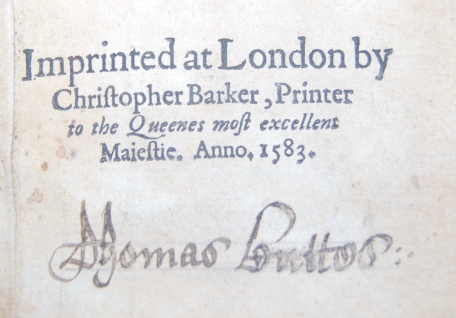
The following images and transcriptions all are reproduced by kind permission of
James Gray an American Antiquarian bookseller who owned and sold on Buttes’ copy
to Princeton University Library where it lives with a number of other copies of the
Sermons! The interest here lies not just in the fact that a book from his library had
survived the centuries, but that the book was annotated and he had filled the blank
leaves with his own calligraphy. James had copies of the following which have been
duly transcribed below including an acrostic paraphrase of the Lords Prayer :

A doozen poyntes to chuse a wyfe by:
-
Of trew religion
-
Of reasonable wisdom
-
Of unspotted honesty
-
Of much humilitie
-
Of greate obedience
-
Of rare temperennce
-
Of chaste manners
-
Of comely personage
-
Of endifferent beauty
-
Of stayed yeres
-
Of honest parenttes
- Of convenyent wealthe
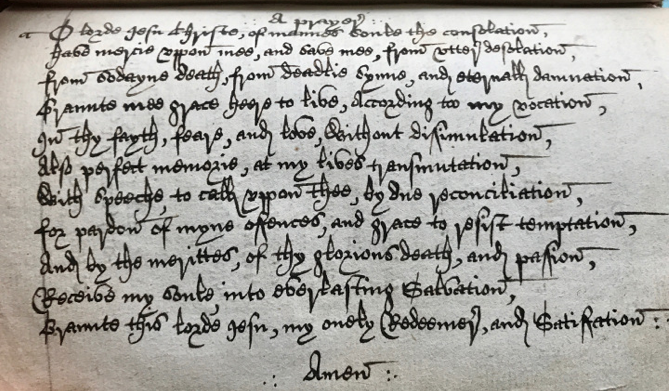
A Prayer
O Lorde Jesu Christe of mannes soule the consolation,
Have mercy upon mee, and save mee from utter desolation,
From sodayne death, from deadlie synne, and eternall damnation,
Grannte mee grace here to live, according too my vocation,
In thy fayth, feare, and love, without dissimulation,
Also perfect memorie, at my lives transmutation,
With speeche, to call upon thee, by ane reconciliation,
for pardon of myne offences, and grace to resist temptation,
And by the merittes, of thy glorious death, and passion,
Receive my soule, into everlasting salvation,
Grannte this Lorde Jesu, my onely redeemer, and satisfaction.
Amen
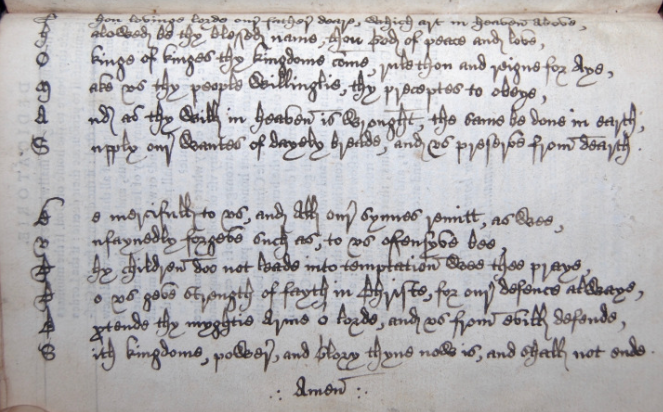
Thou lovinge lorde our father deare, which art in heaven above
H alowed be thy blessed name thou God of peace and love,
O kinge of kinges thy kingdome come rule thou and reigne for aye
M ake us thy people willinglie, thy precepts to obeye,
A nd as thy will in heaven is wrought, the same be done in earth,
S upply our wantes of dayely breade, and us preserve from dearth
B e mercifull to us, and all our synnes remitt as we,
U nfaynedly forgeve onely as, to us offensyde be,
T hy children doo not leade into temptation wee thee praye,
T o us geve strength of fayth in Christe, for our defence alwaye,
E xtende thy mightie arme o lorde , and us from evill defende
S ith kingdome, power, and glory thyne now is and shall not ende.

James’ blog spoke of there being verses upon the Buttes family motto as above but
didn’t include images of those pages. This is the motto that appears on the Buttes
Monument tombs in both Ryburgh:

and Thornage:
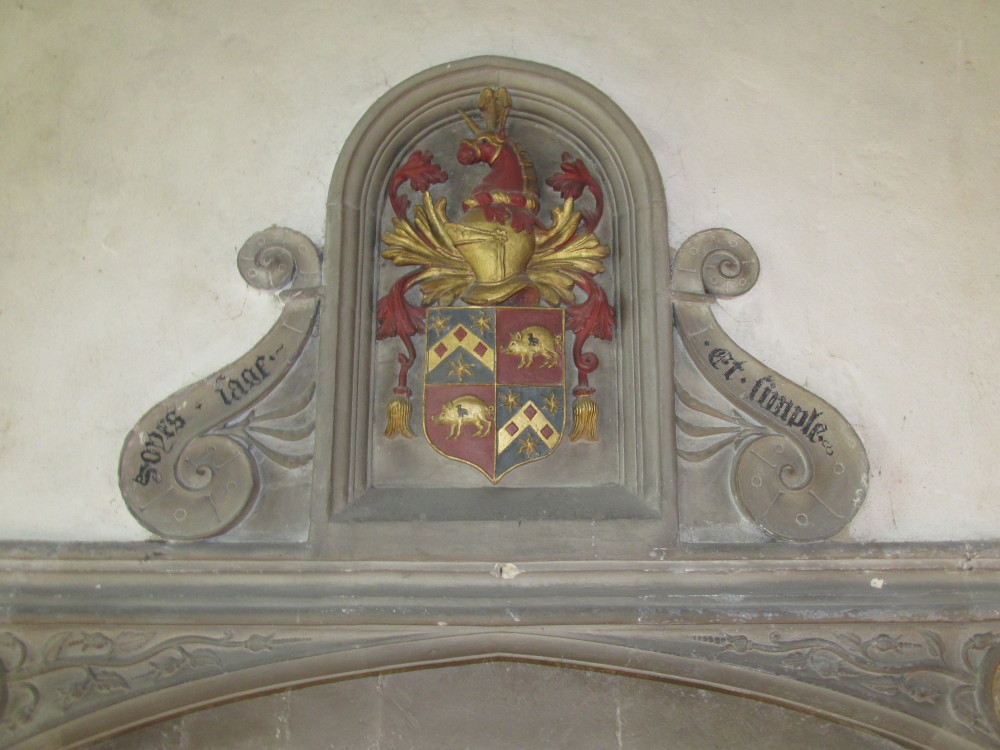
Further research luckily accounts for these verses being present in several other
places, some still to be properly checked by me. The easiest source to find
was in a copy of The History of the College of Corpus Christi……… by Robert
Masters Fellow of the College and of the Society of Antiquaries of London. 1753:
In a volume of Latymer’s Sermons, formerly belonging to him, and wherein his
Name and Motto are oft repeated, are preserved more accurate Copies of the Verses
in the Chapel Windows than those printed in Mr Blomefield’s Collect. Cantab. Which
shall have a place in the App (endix of Masters’ book)
So as well as Latymer's Sermons, Jewell’s Semons, the windows of the Chapel,of
Corpus Christi Cambridge and Blomefield’s book we have have, as stated above the
verses and more printed in the appendix :
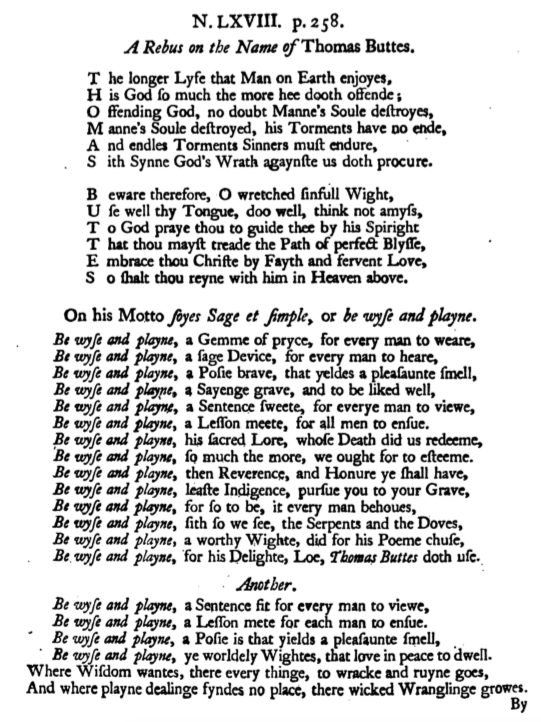
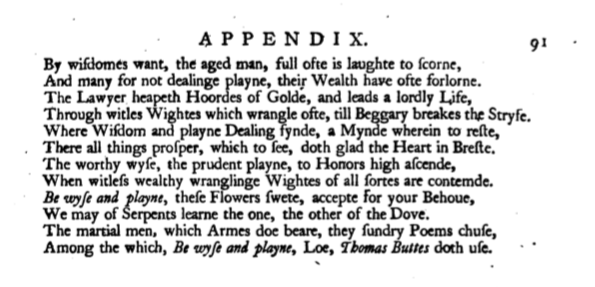
Some of this material turns up again in the Wodehouse Muniments held in the British
Library in Add Mss. 39233 catalogued as being:
Thomas Buttes's rental of Great Ryburgh and Woodhall in Little Ryburgh ; 1572, 1578,
1580. On f. 21v are "Twelue poyntes to chuse a wyfe by," followed by a rhyming
epitaph on the possessor of them and a metrical version of the Lord's Prayer, being an
acrostic of the name Thomas Buttes; calligraphically written, with ornamental initials
inscribed TB. On f. 41v are moral verses: "Soyes sage, et simple. Be wyse, and
playne," followed by lines on a good life, being another acrostic on the name of
Thomas Buttes.
This Mss. has now been investigated and as suggested above there is a little more to
the "Twelve poyntes" as follows:
The gentlewoman that hath these properties in her lyfe,
may well deserve to have this Epitaph at her death.
A bodie chaste, a vertuous mynde.
A temperate tongue, an humble harte,
Secrete and wyse, faythfull and kynde,
True without guyse, mylde without arte,
A freinde to peace, a foe to stryfe,
A spotles mayde a matchles wyfe.
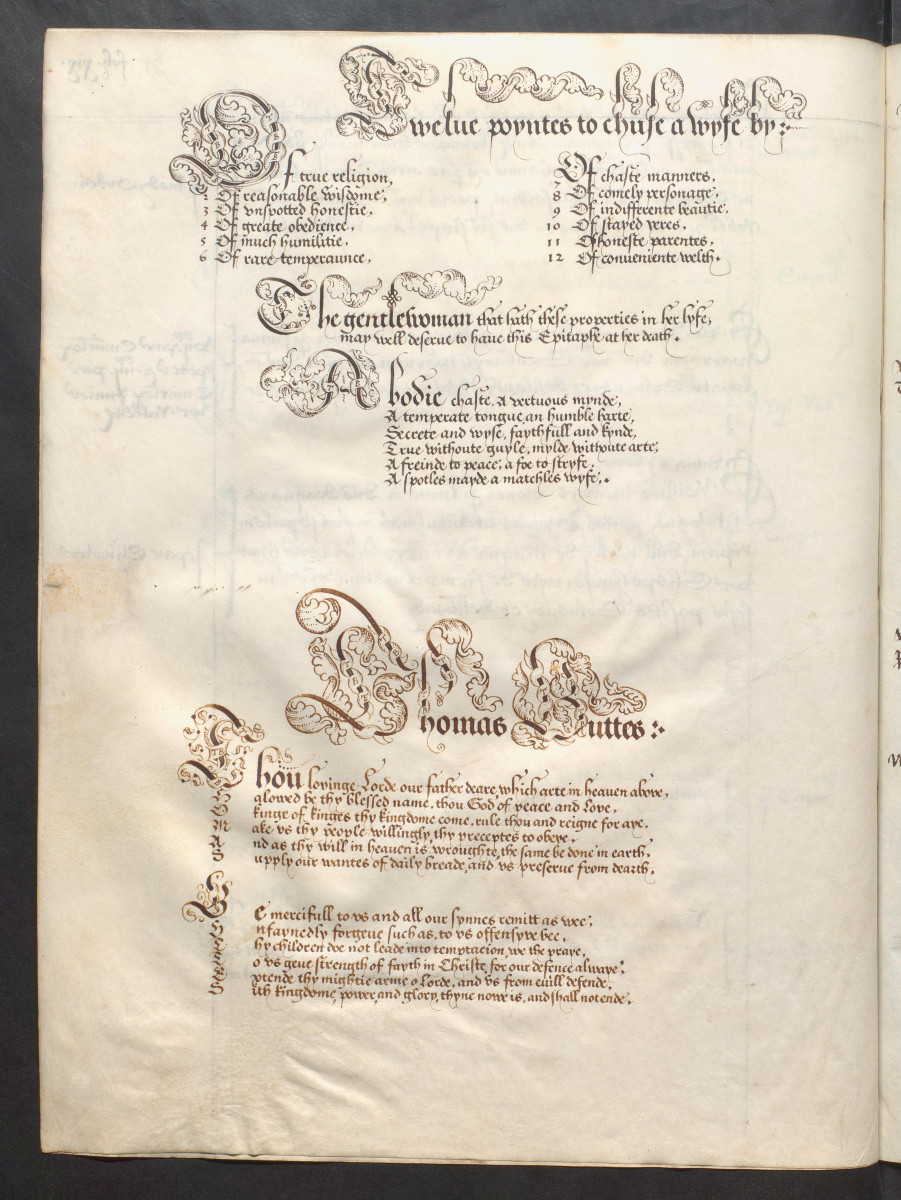
© British Library Board Add Mss 39233 fo 21v
Otherwise, this Mss. yields nothing new. He finishes folio 41v, in case we hadn't
noticed, by signing his name followed by :

© British Library Board Add Mss 39233 fo 41v
Thomas Buttes: havyng the fyrst letter of every
lyne begynnyng wyth a letter of his name.
There may yet be more to be seen of Thomas’ literary work in other sources. Indeed
housed in the Morgan Library in New York is Buttes’ copy of :
The newe testament of our Lord Jesus Christ. Conferred with the Greke, and best
approved translations. With the arguments, as well before the chapters, as for every
boke and epistle, also diversities of readings, and most profiyable annotations of all
harde places: whereunto is added a copious table.Imprinted at London T[homas]
V[autrollier} (Publisher)for Christopher Barker (Printer)1575
The Geneva version, translated by William Whittingham, Anthony Gilby, Thomas
Sampson, and perhaps others, with 3 of Buttes' autograph signatures and lines of
writing and his name printed by hand in several places throughout the book
It would appear from these surviving books and texts that Thomas Butts was
a committed protestant and not entirely because of the social benefits that
the dissolution conferred upon the Buttes family! In his will (transcribed here)
he bequeaths a number of his books to various beneficiaries and shows that
his library, by now probably in his house at Catton where he lived in his latter
years, included the following titles, chiefly religious:
-
my new testam[en]t Lymmed with golde written in old English in prihnt
-
my written service booke
-
my booke called theodore of Bezas confession
-
my booke of Sermons made by Mr John Calvin of upon the epistells of St Paul to the Galations.
-
my little booke all written ………….intituled certayne godly players gathered and taken out of diverse and sondry bookes
-
my booke intituled An exposition upon the two epistles of St Paul to the Thessalonians made by the reverend father in god John Jewell late Bishop of Salisbury
-
my booke called Cowpers Dictionary
-
my booke called Parcustes ( John Parkhurst) Ludicra sive epigramata juvenilia
-
my little booke in latten intituled historiarum [et]cronicorum mundi epitome uelut index usque [ad] annum 1533
-
my booke called pugna porcorum made by placencius
-
my booke intituled the secretes of the Reverend father Mr Alexis of pyemonnt translated out of ffrench into Inglish by will[ia]m warde
-
my booke of parafraces of erasmus
-
Actes and Monnumentes made by Mr John Foxe
-
Six Sermons on Psalms
-
An answere made by ...Thomas Cranmer to a craftie sophisticall cavilacon devised by Stephen Gardiner
-
Godly prayers and meditacions made...by John Filde
-
my greatest olde bible which they have already in the church
-
Booke of Sermons made by Mr John Calvin uppon the booke of Job
-
lectures uppon the xij articles of the faithe made by John Hoper martyr....
-
Aurunm exstercore made by Robert Talbott
-
A replicacon to Mr Hardinges answer made by John Jewell.
-
Greate English Bible bossed
**********
Looking at the will of Thomas Buttes, Ryburgh’s Lord of the Manor during the middle years of the 16th Century, one can’t help wondering just how difficult the conflicts of daily and religious life must have been for him, especially in the extraordinary 10 years of the two reigns of half-siblings Edward Vl. and Mary l. when diametrically opposed religious beliefs held alternate sway. Thomas was born at some point, as yet to be positively ascertained, between 1513 and 1516. The country was Catholic to the point that even Henry Vlll wrote at length against the reforms of Martin Luther and the start of what we now call The Reformation and in the process, earning the Papal Title “Defender of the Faith”, still to be seen on coins today as F.D.
By the time Thomas inherited the Ryburgh Manors from his father after his death in 1545, England had broken from Rome and we had essentially a Protestant Church in England. As those who overtly refused to renounce Rome were executed/martyred, a fresh influx of what we might now call `”influencers” were elevated to high office both in the church and the state. Thomas’ father, Dr. Sir William Buttes, as physician to both Henry Vlll as well at some point to his daughter Mary Tudor, must have been at the heart of the philosophical debates and politics that brought about Henry’s Reformation. Thomas’ library dispersed under the bequests of his will certainly show him to have been well informed on matters ecclesiastical, but this may just be gratuitous obfuscation as they give no clear indication of just where his sympathies lay. Nevertheless, there can be no doubt whatsoever that the Buttes family did very well out of the Dissolution of the Monasteries and their vast land holdings, which of course included Great Ryburgh.
As Edward Vl. furthered the Protestant cause and then Mary l. notoriously, briefly and bloodily executed/martyred the Protestant scourge, Thomas, no doubt like the majority of others, must have just kept his own council since nailing one’s colours to the mast appears to have been a sure way to execution, be you noble or commoner. Thus he made his way out the other side of this very dark period into the reign of Elizabeth and a situation that was arguably no less dangerous for all the fact that the tide had turned once more against Rome.
It starts to get interesting when looking at the circles in which Thomas moved whilst at all times ensuring the accumulated family wealth stayed in the family. Again identity at times with either faction could have led to confiscation of lands and privileges. Was the reversion of the Ryburgh Patronage briefly to Elizabeth between 1568 and 1572 some form of reprimand for showing Catholic colours too obviously? Did his subsequent appointment of Ryburgh Rector, Thomas Waterman in 1572, an appointment that led him to a pursue suit against his “Clark” in Chancery, threaten to endanger his otherwise comfortable position? There must have been a good reason for Thomas to leave Ryburgh and end his days at Catton in 1592, where historically he kept a very low profile, whilst Waterman thrived and continued in post until his death in 1624.
The 3 Buttes brothers were all married to the daughters of Henry Bures who were the wards of their father Dr. Sir William Buttes. Henry Bures widow, Anne Waldegrave, went on to marry Sir Clement Heigham an enthusiastic prosecutor of Protestants in the East of England on Mary’s behalf. And so they might not want to upset their father-in-law too much in the circumstances had they been “too Protestant” or perhaps on the other hand, had they felt, if only for a few short years, relatively safe?
A document headed “By the Queene” in the collection of Buttes’ papers and dating from the last year of Mary’s reign requires Thomas to make a loan of Ten pounds on her behalf in these terms: “So our pleasure is you shall cause the said some of Tenne Poundes to be furthered uppon the survynt hereof payed unto our use to our trusty and well beloved Richard Fulmerston Esquier whome we have appointed to recyve the some at your hand”
As can be seen in their wills, both Thomas and his brother William’s godsons, were Henry and William Shelton respectively. They were the sons of Sir Rafe Shelton and his second wife Anne Barrow who was Thomas' niece, the daughter of Mary Bures (the 4th of Dr. Sir William Buttes wards) and Thomas Barrow of Barningham in Suffolk. Henry and William therefore were cousins to Edmund Buttes and Anne Bures daughter, Anne Buttes the ultimate heir, together with her husband, Sir Nicholas Bacon, of the combined Buttes/Bures wealth. Sir Rafe’s parents and grandparents both had close associations with both the Princesses, Mary and Elizabeth and additionally, Sir Rafe’s Grandmother, Lady Anne Shelton was Queen Anne Boleyn’s aunt. Her son and Rafe’s father, Sir John Shelton was a member of Mary’s household and the family were also Mary’s protectors during quarrels with Elizabeth. Despite that, the Shelton family continued to play an important role in Elizabeth’s court.
It is not possible to know quite where Thomas Buttes own religious sympathies lay and he appears to have maintained a lifelong study of the theology of the era. However, in the hands of his descendants through the Bacon family in the C17th., it certainly took a leaning towards Puritanism…… but that has to be for another time and place, except to say that Sir Robert Bacon and his wife Lady Ann (Peyton) whose engraved ledger stone lies in the chancel floor (though previously in the crossing) at St Andrew’s resided in Ryburgh (probably at the Old Hall) for 40 years or so, as long or perhaps longer than Thomas Buttes did.
Copyright Peter Trent 2022